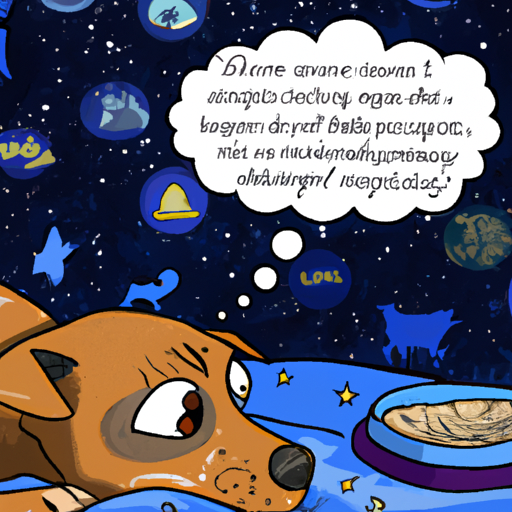As a passionate caregiver, there’s nothing more heart-wrenching than watching your furry friend twitch, whine, or whimper in their sleep. You’ve probably wondered, “What do dogs have nightmares about?” Below, we’ll delve deep into the canine subconscious and explore the world of dog dreams and nightmares.
1. Understanding Dog Sleep Patterns
Just like humans, dogs experience different stages of sleep. These include light sleep, deep sleep, and REM (Rapid Eye Movement) sleep. It’s during the REM stage that dogs, like humans, are likely to dream.
- Light sleep: This is a transitional stage between wakefulness and sleep where your dog might twitch a bit but isn’t fully asleep.
- Deep sleep: In this stage, your dog’s brain activity slows down, and they become less responsive to their surroundings.
- REM sleep: This is the stage in which most dreaming occurs. You might notice your dog’s eyes moving rapidly beneath their eyelids, hence the term “Rapid Eye Movement.”
2. Do Dogs Have Nightmares?
While we can’t ask our dogs what they dream about, scientific research suggests that they do indeed have nightmares. Dogs often show the same physical reactions during sleep as humans do, including rapid eye movements, irregular breathing, and even vocalizations like whimpering or barking.
3. What Could Dogs Dream About?
If dogs dream, what could they be dreaming about? We can only speculate, but here are some common theories:
- Past experiences: Dogs might relive moments from their day, like a fun game of fetch or a stressful visit to the vet.
- Fear or anxiety triggers: Dogs could dream about things that scare or stress them out, such as thunderstorms or fireworks.
- Instinctive behaviors: Dogs might dream about chasing squirrels, digging holes, or other instinctive behaviors.
- Their humans: Yes, your dog might be dreaming about you!
4. How to Help Your Dog After a Nightmare
If your dog appears to be having a nightmare, here’s what you can do:
- Don’t wake them abruptly. They might wake up confused and scared, which could lead to accidental bites.
- Speak to them in a soft, soothing voice to help them transition back to wakefulness.
- Provide comfort and reassurance once they’ve woken up.
5. Preventing Nightmares in Dogs
While we can’t completely prevent our dogs from having nightmares, there are steps we can take to help reduce their occurrence:
- Provide a safe and comfortable sleeping environment.
- Maintain a consistent schedule.
- Ensure plenty of exercise and mental stimulation.
- Manage stress and anxiety triggers.
FAQs
Q: How often do dogs have nightmares?
A: There’s no set frequency. Just like humans, some dogs might have nightmares more often than others.
Q: How can I tell if my dog is having a nightmare?
A: Dogs might whimper, twitch, or move their legs as if running. They might also show signs of distress like panting or rapid breathing.
Q: Should I wake my dog from a nightmare?
A: It’s generally best not to wake dogs from nightmares, as they might wake up confused or scared.
Q: Can a dog’s diet impact their dreams?
A: While there’s no definitive research, a balanced and healthy diet can contribute to overall well-being, which might influence sleep quality.
Remember, as a caregiver, your role is to provide a safe and comforting environment for your dog, even during their sleep. If nightmares persist, consider seeking professional help from a vet or animal behaviorist.



